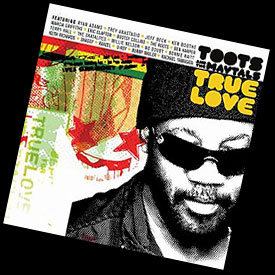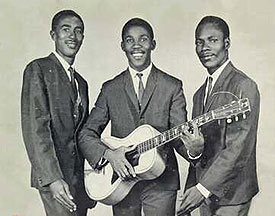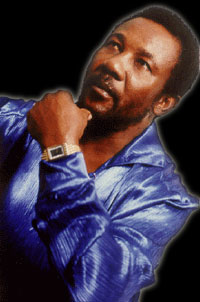
|
||
| Volume III, Issue III | Autumn 2004 | |
| Autumn 2004 Home Page |
| Culture/ Technology |
| Fiction |
| Music |
| Poetry |
| Theater |
| About / Contact |
| Archive |
| Current Home Page |
Fame for all the wrong reasons
Toots Hibbert's real accomplishments overlooked by American fans
It's a depressingly familiar scenario: the veteran artist whose influence and contributions far outpace their commercial success finally receives a measure of long overdue mainstream recognition late in their career, after recording an album all a-twitter with guest stars, at least some of whom are clearly unworthy of polishing the principal's boots with their nose oil. Consider star-studded "comeback" albums over the years by Solomon Burke, Wanda Jackson, Buddy Guy, Carlos Santana and John Lee Hooker, just to name few; great artists who never really went anywhere to "come back" from in the first place, but you'd never know that from the neglect they endured for years prior to the VH1-or-MTV-approved celeb hook-ups.
The latest beneficiary of this dubious elbow-rubbage is Toots Hibbert, among the founding fathers of and towering figures in reggae music, whose relative lack of stateside renown long consigned him to the club circuit on these shores, despite his sterling accomplishments and undeniable status as a pioneering, all-time great.
 Toots & the Maytals' latest CD, "True Love," is a collection of Hibbert classics re-recorded as duets with myriad bigwigs; the results predictably range from the sublime (collaborations with Bunny Wailer, Jeff Beck and Bootsy Collins) to the ridiculous (collusions with Ryan Adams, Gwen Stefani and Willie Nelson). Of course, "True Love" quickly became Hibbert's best-selling album and yielded more American media attention than he'd collectively received since his recording debut some four decades earlier.
Toots & the Maytals' latest CD, "True Love," is a collection of Hibbert classics re-recorded as duets with myriad bigwigs; the results predictably range from the sublime (collaborations with Bunny Wailer, Jeff Beck and Bootsy Collins) to the ridiculous (collusions with Ryan Adams, Gwen Stefani and Willie Nelson). Of course, "True Love" quickly became Hibbert's best-selling album and yielded more American media attention than he'd collectively received since his recording debut some four decades earlier.
"I'd been waiting a long time to do something with Bonnie Raitt," says Hibbert in a Jamaican patois thick as a coconut shell. "So we get in touch and work on it and get it done. We know her over the years, she always come on my stage and I always go on her stage whenever we see each other on the road. From there we send out music to others and they pick the songs they like."
Hibbert's duet with Raitt on "True Love Is Hard To Find" is one of the highlights of the album; mission accomplished. However, the thin-throated likes of Adams, Stefani and Nelson come off like Pee Wee Herman in the ring versus Muhammad Ali when positioned aside Hibbert's might. More power to Toots for his belated and much-deserved commercial triumph, but longtime fans will continue to recognize the original recordings of such reggae standards as "Pressure Drop," "Monkey Man," "Funky Kingston" and "54-46 Was My Number" as the definitive, untouchable versions.
"Yeah, I know," Hibbert concurs. "But this music was from a long time ago. It's good songs and it's good we do them in a different style. It was a chance to put the Jamaican roots to the American roots with these great Americans. They have different tastes. People like Willie Nelson, they have so many different great recording, I'm their fans and they're my fans. It needed to be done. I'm seeing a lot of people [at concerts]. I saw a lot of people before, but now it's more noisy, a lot of people in my audience now. It's always been good over the years, but this is better."
Perhaps "True Love" is the logical upshot of a career always based on musical and cultural juxtaposition. Hibbert is the tuffest of all reggae singers; a sweating, thrashing, grunting dynamo possessed of meaty, rawhide pipes, whose style owes as much to American r&b as it does Island Riddim.
 "I first start out listening to Jimmy Cliff, Ray Charles – a lot of r&b record and Jamaican record too," says Hibbert. "I develop my style on my own because I want to sound like me. I sound like different person – Otis Redding, James Brown, Ray Charles – I sound like so many people, but the talent is mine."
"I first start out listening to Jimmy Cliff, Ray Charles – a lot of r&b record and Jamaican record too," says Hibbert. "I develop my style on my own because I want to sound like me. I sound like different person – Otis Redding, James Brown, Ray Charles – I sound like so many people, but the talent is mine."
Hibbert has sometimes claimed to be *the* creator of reggae music; his 1968 single, "Do The Reggay" signified the first use the word. These days, Hibbert has softened his stance somewhat, but the fact remains that the genre acquired its title from his record.
"People know that reggae is reggae before they call it that," he says. "Before that they call it bluebeat and boogiebeat. It was the same thing before people call it reggae. Before I record 'Do The Reggay,' I didn't really know I was putting the name in the music. I was just playing my guitar, make a few lines and the word 'reggay' come out."
Hibbert's elaboration on the word's origin bespeaks a curious coincidence; "reggay" was a variation of a Jamaican slang term that roughly translated into the American slang term "skank"; "skanking" later became the designation for the swaying dance performed to reggae music.
"In Jamaica we have a slang called 'streggay,'" he explains. "If a girl see a guy walking without a shirt, she call him 'streggay.' If we see a girl not looking good, we call her 'streggay.' So from that word I just say, 'Let's do the reggay.'"
 Reggay, rocksteady, bluebeat, boogiebeat; term it what you will, but in the years since Hibbert and several Kingston Kohorts first created what is today known as reggae, the music has morphed into many modern mutations. Dub, dancehall, ragga – it seems like every derivative claims its own handle, but to Hibbert, roots reggae remains the real deal.
Reggay, rocksteady, bluebeat, boogiebeat; term it what you will, but in the years since Hibbert and several Kingston Kohorts first created what is today known as reggae, the music has morphed into many modern mutations. Dub, dancehall, ragga – it seems like every derivative claims its own handle, but to Hibbert, roots reggae remains the real deal.
"I like what goes on today, but real reggae is real reggae," he opines. "Real reggae is people like Jimmy Cliff and Peter Tosh and Bob Marley and Derrick Morgan, and me also. Now they use computer and machine, it become light, it does not have the same effect, it does not have the message that real reggae must have. It's more fancy and it's more negative. I appreciate what they are doing today, they're learning every day more and more, but they need a lot more positive message in dancehall, you know. Too much pressure it build up, too much agony. A more positive song is better for the world."
Are those positive vibrations what keeps Hibbert going strong on the road year after year, vigorous and wicked as ever, even as he closes in on age 60?
"Yeah, wicked mon – you can never have enough energy and I still have all my energy!
![]()
Autumn 2004 Music Section | Autumn 2004 Main Page
Current Music Section | Current Home Page
Copyright ©
Reprinted by permission of author, who retains all copyright and control.